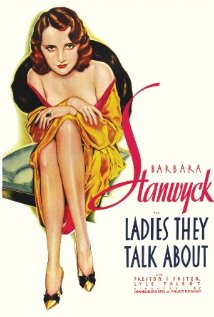
LADIES THEY TALK ABOUT
US, 1933, 69 minutes, Black and white.
Barbara Stanwyck, Preston Foster, Lyle Talbot, Dorothy Burgess, Lillian Roth, Maude Eburne, Ruth Donnelly.
Directed by Howard Bretherton and William Keighley.
Barbara Stanwyck was in the early years of her career when she made this film but was certainly a striking screen presence, full of confidence, full of charm when she wanted, very tough also when she wanted, a beautiful star in the making. And she was to fulfil her potential over many decades, unfortunately never winning an Oscar, despite performances in such films as Double Indemnity.
This is a tough potboiler from 1933, made before the application of the Motion Picture Code and its strictness – in the prison sequences there is a former madame of a brothel who refers to her business in terms of a shop – and also has the last word in saying that Barbara Stanwyck’s character would be most welcome in her shop! There is also a glimpse of a very butch prisoner, in male clothes… While there were to be tough women’s prisons films in the years to come, including Eleanor Parker and Hope Emerson in Caged, 1950, it was not until the 1970s with the sexploitation films that all these sexual elements in prisons came to the fore again.
Barbara Stanwyck portrays Nan, a criminal, brought up in her home town in a deacon’s family but rebelling against it, posing as a wealthy woman and persuading a guard to open a bank, with the result that the bank was robbed. Because she is known to the police, she is charged. In the meantime, David Slade is a moral campaigner, also from Nan’s hometown. He speaks to large audiences on law and order – but, on meeting Nan again, he falls for her and she for him. She tells the truth about her role in the robbery and is charged and sent to prison.
Much of the film is set in the prison, the women being very tough, Dorothy Burgess as Susie, a born-again Christian devoted to David Slade who sets up Nan for further punishment. Of great interest is Linda, a sympathetic prisoner, who also sings, played by singer and actress, Lillian Roth (whose MGM biography, I’ll Cry Tomorrow featured Susan Hayward in the role). David Slade is played by Preston Foster.
1. The title and expectations? A film of 1933? Pre- Motion Picture Code?
2. The ladies, criminals, gangsters’ molls? Featured glamorously in the newspapers with photos and stories? In prison? The range of women in the prison? Black and white?
3. Robbery story, Nan and her glamour, with the gang, persuading the guard to let her into the bank, the robbery, her fainting? Her being charged, recognised by the detective? In prison, expecting to get out?
4. David Slade, his moral campaigns, like religious revival meetings, the applause, especially from women, promise of law and order? His meeting Nan, memories of the past, the different upbringings? His being infatuated with her, the plan with the DA to get her out, part of his campaign? Her telling the truth, his reaction, testifying against her in court, her imprisonment? His writing letters, her ignoring them? Eventually wanting to see him, the plan for the male prisoners and their tunnel, putting the letter in his jacket?
5. The prison, Maggie, her brothel past, the way she talked about her work, dominant, the chair, friendly? Protective? Susie, the antagonism towards Nan, born-again, plotting against Nan? Nan punching her? Linda, friendship, the two of the prison? Her singing? Supporting Nan? The aristocratic prisoner, murder, her treatment of the black prisoner?
6. The guards, severity, freedoms? Noonan and the parrot on her shoulder? Sympathetic towards Nan? Helping her? Nan being framed, the work and the laundry?
7. The contact from Lefty, his visits, the plan, Nan talking with Noonan and the impression of the keys? The plan of the cells?
8. The title, the men being caught? Nan and her anger against David Slade?
9. Getting out, into the rally, Susie as part of the choir, Nan with the gun, confronting David, blaming him about the capture of the criminals and their deaths? Susie at the keyhole? The detective, the shot, David disguising it, the detective knowing the truth, Nan putting the notice on the keyhole?
10. Happy ending – but for how long?